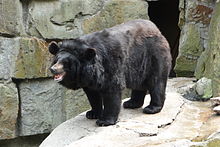Ussuri black bear
Appearance
| Ussuri black bear | |
|---|---|

| |
| Scientific classification | |
| Domain: | Eukaryota |
| Kingdom: | Animalia |
| Phylum: | Chordata |
| Class: | Mammalia |
| Order: | Carnivora |
| Family: | Ursidae |
| Genus: | Ursus |
| Species: | |
| Subspecies: | U. t. ussuricus
|
| Trinomial name | |
| Ursus thibetanus ussuricus Heude, 1901
| |
| Synonyms | |
|
Selenarctos thibetanus ussuricus | |
The Ussuri black bear (Ursus thibetanus ussuricus), also known as the Manchurian black bear, is a large subspecies of the Asian black bear native to the Russian Far East, Northeast China and the Korean Peninsula.[2][3][4][5]
Etymology
[edit]The subspecies is named after the Ussuri River.[3]
Ecology
[edit]Sympatric predators include the Ussuri brown bear and Siberian tiger.[3][4]
References
[edit]- ^ "Asian Black Bear". gbif.org.
- ^ Wu, Jiaqi; Kohno, Naoki; Mano, Shuhei; Fukumoto, Yukio; Tanabe, Hideyuki; Hasegawa, Masami; Yonezawa, Takahiro (2015-09-25). "Phylogeographic and Demographic Analysis of the Asian Black Bear (Ursus thibetanus) Based on Mitochondrial DNA". PLOS ONE. 10 (9): e0136398. Bibcode:2015PLoSO..1036398W. doi:10.1371/journal.pone.0136398. ISSN 1932-6203. PMC 4583410. PMID 26406587.
- ^ a b c Heptner, V. G. & Naumov, N. P. (1998). White-chested, black bear. Pages 713–733 in: Mammals of the Soviet Union Vol. II Part 1a, Sirenia and Carnivora (Sea cows; Wolves and Bears). Washington, D.C. : Smithsonian Institution Libraries and National Science Foundation.
- ^ a b Seryodkin, I.V. (2003). "Denning ecology of brown bears and Asiatic black bears in the Russian Far East" (PDF). Ursus. 14 (2): 153–161. JSTOR 3873015.
- ^ Kadariya, Rabin; Shimozuru, Michito; Maldonado, Jesús E.; Moustafa, Mohamed Abdallah Mohamed; Sashika, Mariko; Tsubota, Toshio (2018-12-05). "High genetic diversity and distinct ancient lineage of Asiatic black bears revealed by non-invasive surveys in the Annapurna Conservation Area, Nepal". PLOS ONE. 13 (12): e0207662. Bibcode:2018PLoSO..1307662K. doi:10.1371/journal.pone.0207662. ISSN 1932-6203. PMC 6281213. PMID 30517155.
